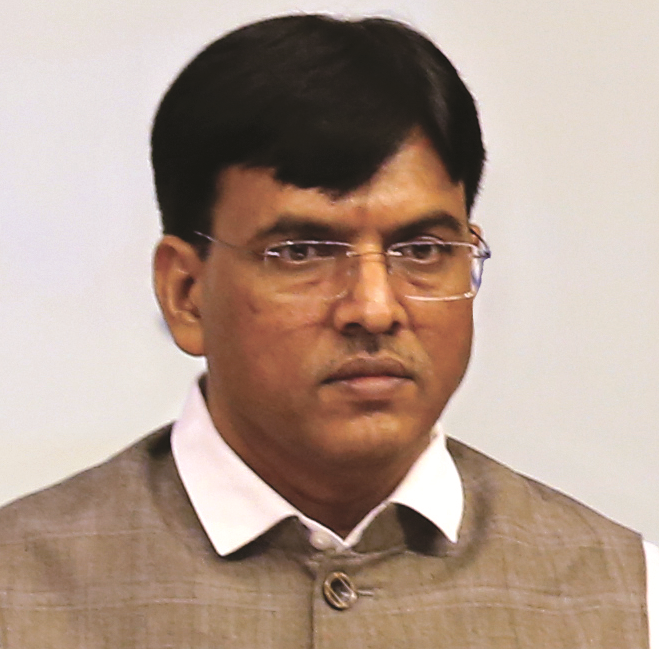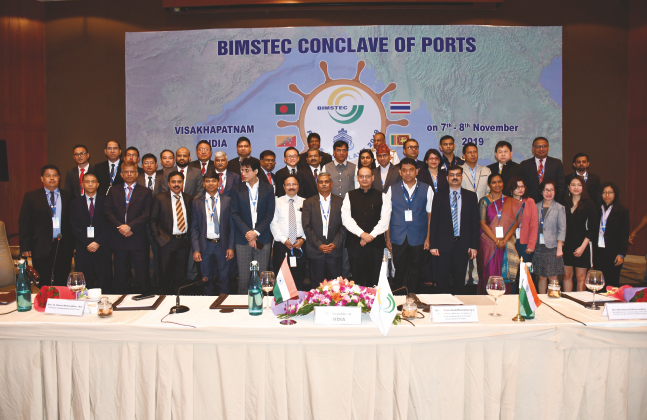BIMSTEC members coincided on the need to maximise intraregional trade, connectivity and cooperation to improve productivity and ultimately benefit the customer
Promoting intraregional trade and connectivity, port-led industrial and tourism development, containing the environmental impact of ports and economic activities and promoting use of green technologies were some of the important takeaways from the first ever BIMSTEC Conclave of Ports organised at Visakhapatnam. The conclave had a vision to develop a BIMSTEC community of interest among the ports of the region, considering the specific characteristics of the region and also to harness various comparative advantages at the BIMSTEC ports, as productivity at the ports will lead to prosperity of the entire region.The conclave also aims at promoting regional industries and associated infrastructure.
The event was inaugurated by Shri Mansukh L Mandaviya, Hon’ble Union Minister of State for Shipping, Government of India. The minister in his inaugural address highlighted the Indian capacities in the maritime sector and offered a platform for utilisation of these services by member nations. He also stressed on the motto “peace, prosperity and security of all the member BIMSTEC nations.” He called for forging deeper relations, trade and connectivity amongst various BIMSTEC nations by improving maritime connectivity. He mentioned the recent visit of H E Sheikh Hasina, MP, Prime Minister of Bangladesh to India, when a SOP was signed for direct connectivity from all Indian ports to Mongla and Chattogram Ports. This connectivity helps in moving cargo to north eastern states of India. Till recently, India had road, rail and air connectivity with north east, but lagged behind in connectivity through waterways. Another development highlighted by Mandaviya was that India has dredged Brahmaputra river in Bangladesh which is declared as the protocol route connecting Varanasi – Haldia – sundarban – Ashuganj – Tripura. Food grains will be moved along this route. CONCOR has been moving 50,000 metric tonnes of food grains on monthly basis to north east states. The distances on this route are as follows:
Varanasi to Haldia – 1400km
Haldia to Sundarban – 100km
Sundarban to Ashuganj – 300km
India has developed Sitwe port in Myanmar that connects Mizoram through the Kaladan waterways project.
The Minister of Tourism, Culture and Youth Advancement, Govt of Andhra Pradesh, M S Rao, the Minister of Industry, Commerce and Information Technology, Govt of Andhra Pradesh, MG Reddy along with Member of Parliament from Visakhapatnam M V V Satyanarayana also attended the Conclave.
Three Memorandum of Understanding were signed during the event between Ranong Port (Port Authority of Thailand) and the Port Trusts of Chennai, Visakhapatnam and Kolkata. These MoUs will contribute to BIMSTEC objectives of strengthening connectivity and is part of India’s Act East Policy. They will enhance connectivity between ports on Thailand’s West Coast and Ports on India’s East Coast i.e. Chennai, Vishakhapatnam and Kolkata. Ultimately the sea travel time between India and Thailand will be cut down from 10- 15 days to 7 days.
Various member nations presented perspectives of their port operations which helped in understanding the systems and practices prevalent in the nations meant for productivity, safety and environmental sustainability.
Five panel discussions were organised during the conclave: the first discussion focused on port-led industrial and tourism development. It highlighted the need to promote industrial and manufacturing parks, SEZs in close proximity with the ports, so that logistics cost can be brought down. The session also observed the necessity to foster PPP for developing tourist potential at ports. The cultural and historical linkages among the BIMSTEC nations is also the need of the hour. The second session discussed emerging role of ports in global supply chain. The hyper connected globalised world supply chains are extending beyond the national boundaries. Promotion of regional interconnectivity and intra-regional trade among the BIMSTEC nations is found to be the need of the hour. The session also felt the need to promote smart ports with the adoption of electronic data interchange connectivity and also establishment of an IT-based common single window system for the exporters and importers in the BIMSTEC nations.
The third session discussed safe and secure ports. The deliberations pointed at the need for establishing rule based managing order in the Bay of Bengal and a vibrant transoceanic security community for robust multilateral cooperation. Adoption of common security standards among the BIMSTEC nations and sharing of information on coastal and maritime security will help in establishing more secure port infrastructure in the region.
Discussions on “Port services delivering value” called for providing a good user experience through streamlined and standardised procedures and services and a clear line of communication on important facets of port operations. Production of high productivity port equipment to provide services at competitive cost and simplification of procedures in documentation and clearance of cargo are the needs of the hour at our BIMSTEC ports.
The last session talked about green port operations and the discussion was aptly held at Visakhapatnam Port as this port sources its complete energy requirements from solar power. The development of ports and consequent economic activity has resulted in adverse impact on the environment, so it is the responsibility of all the ports to provide environmental clean systems to the public who are residing around the port ecosystem. The session also focused on common technological solutions which are required to ensure the compliance of requisite green norms. The use of low sulphur fuel and renewable energy have to be promoted to reduce carbon footprints. The BIMSTEC nations must ensure the implementation of the dialogue which has been initiated at this event. A general working group is to be set up to take the dialogue forward and also explore the possibility of establishing a Maritime Coordination Center to coordinate various aspects of maritime services among BIMSTEC nations.
We must share the resources and expertise to tackle the various disasters in an effective way as Bay of Bengal is more prone for disasters. The crux of the issue is minimising the logistics cost, environmental impact and maximising productivity, security and ultimately benefit to the customer. BIMSTEC nations have so far been loosely integrated and have been trading more with the US and the EU as compared to trade with neighbouring countries. Poor connectivity between the neighbouring countries has also resulted in high logistics cost and further tariff and non-tariff barriers have been a major stumbling block to mutual trade growth. The BIMSTEC Ports Conclave has offered a perfect platform to resolve these issues and promote trade and connectivity in the best interest of the region.

“Till recently, India had road, rail and air connectivity with north east, but lagged behind in connectivity through waterways. The SOP signed during the recent visit of H.E. Sheikh Hasina, MP, Prime Minister of Bangladesh to India for direct connectivity from all Indian ports to Mongla and Chattogram Ports will help in moving cargo to north eastern states of India through waterways. “–
Mansukh L Mandaviya
Hon’ble Union Minister of State for Shipping,
Government of India








